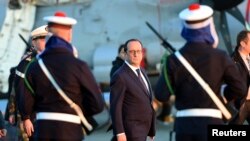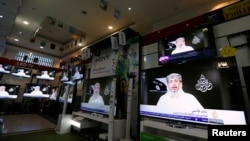France is increasing its participation in anti-Islamic State airstrikes by sending its flagship aircraft carrier to the Middle East, following a terror spree that killed 20 people, including three gunmen, last week in Paris.
From aboard the Charles de Gaulle aircraft carrier, French President Francois Hollande condemned the international community's slow response to the militant group as it overran parts of Iraq and Syria. He told troops the situation "justifies the presence" of the vessel in the region.
"So the mission that is starting is also an answer to terrorism. We are at war with them. So we must use military means that are best suited to face those threats," said Hollande.
One of the gunmen in the Paris attacks claimed allegiance to the Islamic State group.
The announcement follows a vote by French lawmakers on Tuesday to extend the country's military engagement alongside the United States and other nations in a sustained air campaign against the Islamic State group in Iraq and Syria. France was one of the first partners in the U.S.-led coalition.
AQAP claims attack
Al-Qaida's branch in Yemen officially claimed responsibility for last week's attack on the Paris offices of French satirical magazine Charlie Hebdo, saying it was an "act of vengeance" for the Prophet Muhammad.
Charlie Hebdo regularly publishes anti-religious pieces and has several times published illustrations featuring the prophet, an act many Muslims consider sacrilegious.
In a video posted online Wednesday, a man identified as Nasr al-Ansi, a top leader of al-Qaida in the Arabian Peninsula (AQAP), said his group planned and financed the Charlie Hebdo attack in which two radicalized brothers killed 12 people. A third attacker, who al-Ansi claims acted independently, killed one police officer and four people at a kosher supermarket in Paris.
"As for the blessed Battle of Paris, we, the Organization of al-Qaida al Jihad in the Arabian Peninsula, claim responsibility for this operation as vengeance for the Messenger of God,” Ansi said in the clip.
U.S. officials have found the video to be authentic.
First post-attack edition
On Wednesday, Charlie Hebdo put out its first edition since last week's attack, with a cover that featured a cartoon illustration of a weeping Prophet Muhammad on the cover, along with the line "All is Forgiven." The issue has been selling out across France.
Up to five million copies of the issue were being printed - a huge jump from its usual 60,000 per week.
The editor-in-chief has said that print copies will stay on sale for two weeks, and the online edition will be available in English, Spanish and Arabic as well as French.
Click below for the cover of the latest Charlie Hebdo issue:
AQAP leadership
Ansi, the main ideologue for AQAP, said the “one who chose the target, laid the plan and financed the operation is the leadership of the organization,” without naming an individual.
He added, without elaborating, that the strike was carried out in “implementation” of the order of overall al-Qaida leader Ayman al-Zawahri, who has called for strikes by Muslims in the West using any means they can find.
State Department spokeswoman Marie Harf said Washington is trying to determine what links may have existed between the extremist group and the gunmen who carried out the attack.
The recording carried the logo of the al-Qaida's media group, al-Malahem.
Some doubt claim
A number of Yemeni analysts have indicated in recent days that they thought al-Qaida was linked to the Paris attacks, but Khattar Abou Diab, who teaches at the University of Paris, said he thinks the claims are a bit far-fetched.
Abou Diab said that the world of jihadis is no doubt part of the same tree, and all of its parts, such as the Islamic State group, Jabhat al Nusra, al-Qaida and Boko Haram are just branches of it.
But, he argued, from an operational standpoint, the Paris attacks seem more like a family undertaking between brothers Said and Cherif Kouachi and their African friend, Ahmed Coulibaly.
Abou Diab said the three acted as a small cell in what looks like a “lone wolf” operation. He pointed out that the operation wasn't extremely professional, either, since one of the brothers forgot his ID card at the scene.
Abou Diab said he thinks terrorist attacks have much more complicated roots than simple religious extremism.
Attackers
French police killed the Charlie Hebdo attackers, the Kouachi brothers, on Friday, the same day Islamic militant Coulibaly killed four Jewish victims at the kosher supermarket in eastern Paris before being killed by police. Coulibaly had also killed a French policewoman one day earlier.
The al-Qaida in Yemen leader said Coulibaly was not operating as a part of the group and that his actions were a coincidence.
One of the two Kouachi brothers reportedly traveled to Yemen in 2011 and received training in an al-Qaida camp. Sheikh Anwar al-Awlaki, who was killed in a U.S. drone strike that year, has been tied to various terrorist plots, including a failed shoe-bomb attack against a U.S. airliner.
Arab media reported that al-Qaida in the Arabian Peninsula had also claimed responsibility for a devastatng suicide bombing against a Yemeni police academy the same day as the Paris attacks. It has not been determined if the attacks were coordinated.
Yemen has been torn apart in recent months by multiple conflicts between rival factions, including bitter fighting between Sunni al-Qaida fighters and the Shi'ite Houthi rebel milita.
The Houthis took control of the Yemeni capital, Sanaa, in September, creating tensions with other tribal leaders and hardline Sunni religious figures.
Hate speech crackdown
Meanwhile, France ordered prosecutors around the country Wednesday to crack down on hate speech, anti-Semitism and glorifying terrorism, announcing that 54 people had been arrested for those offenses since the Paris terror attacks.
French comedian Dieudonne was arrested Wednesday for defending terrorism, after posting a statement on social media that seemed to support last week's attackers.
Dieudonne has won notoriety with his outspokenness in the past, most notably for popularizing an arm gesture deemed by some to be anti-Semitic because it resembles the Nazi salute.
Like many European countries, France has strong laws against hate speech and especially anti-Semitism in the wake of the Holocaust.
Edward Yeranian contributed to this report from Cairo. VOA's Jeff Seldin contributed to this report from Washington. Some material for this report came from Reuters and AP.






